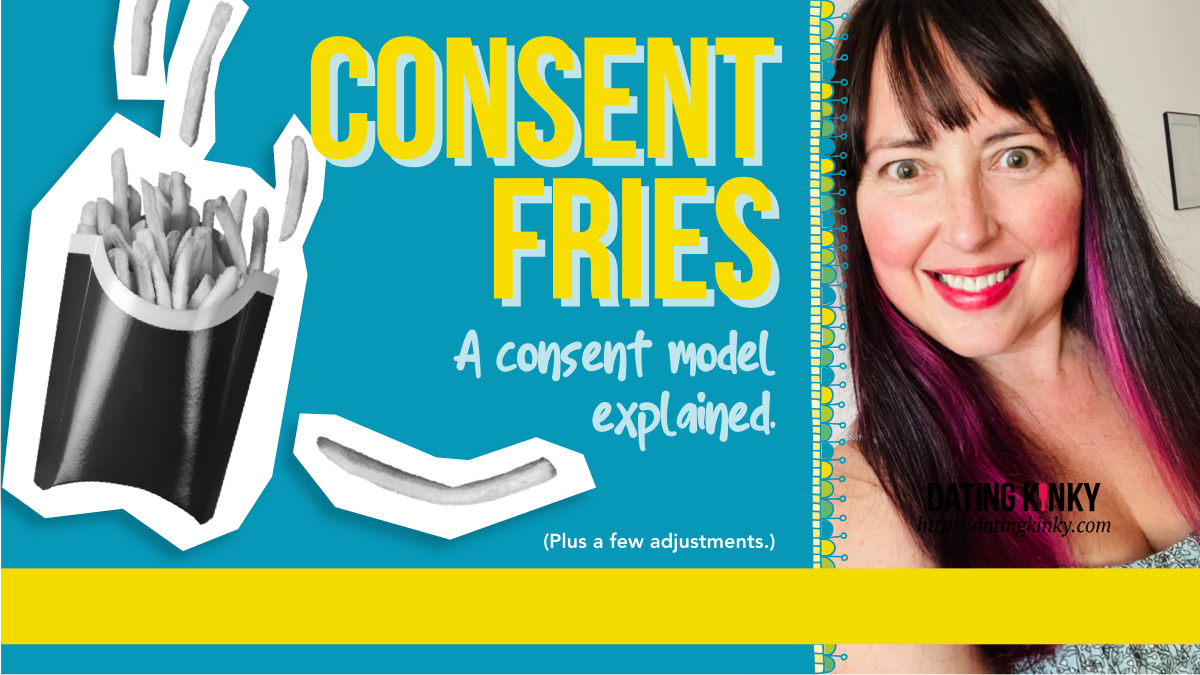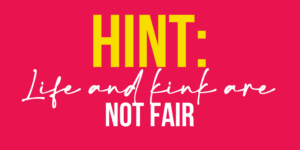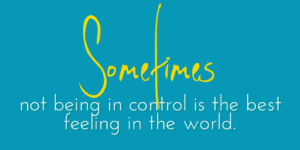Consent is key in kink, but I also maintain that it is key in life.
And, if you’ve been following me for long, you know that I am ALL ABOUT strong boundaries. And boundaries, in all aspects of life (physical, sexual, emotional, financial, time, and intellectual) are all about what you consent to having in your life.
Which, once you start to think about, can be pretty mind-blowing.
One of the questions I offer to help you understand your emotional boundaries, for example, is, “Do you allow or welcome others to examine or probe your emotions?”
Because this matters.
When you are in conversation, what you consent to share or allow others others to dig for will determine how you engage, and how you ask them to engage (or remove yourself from the situation).
So, since consent is at the core of everything, it’s incredibly helpful to understand just what consent actually is.
So, of course, I made a video.
smiles
TRANSCRIPT
Consent FRIES
A Consent Model Explained
(Plus a few adjustments)
FRIES:
Freely given
Revocable
Informed
Enthusiastic/Engaged
Specific
The original FRIES consent model was created and shared by Planned Parenthood. They did an amazing job, and I acknowledge their work on this and other areas of women’s health, and the good fight they fight to make our sexual world a better place to be.
What is consent?
Consent is when one person voluntarily agrees to the proposal or desires of another
The idea is most often used for sexual or intimate situations, but actually applies to well, pretty much everything.
What that “voluntary agreement” looks like in practice can sometime feel confusing.
The FRIES consent model is a good basic way to lay it out.
F. Freely given. Doing something sexual with someone is a decision that should be made without pressure, force, manipulation, or while drunk or high.
Good consent happens when the agreement is not affected by:
- Pressure
- Manipulation
- Alcohol
- Drugs
- Threats
- Physical force
When someone consents under those influences, you can’t really be sure that they are truly willing and would have agreed in another scenario.
Best to hold off.
R is for Reversible. I prefer to use Revocable, though.
The definition of reversible is capable of going through a series of actions (such as changes) either backward or forward
Revocable means capable of being revoked, and revoke means to annul by recalling or taking back.
I personally don’t feel the word “reversible” is ideal for consent discussions, because what is done under consent cannot be reversed. We can’t take back actions or consent after actions have been performed.
But we can revoke it, and stop any additional actions from occurring moving forward. Even if we’ve done it before. Even if you’re in the middle of doing it. And that is what matters.
I. Informed. Means that you KNOW what you’re agreeing to.
That includes risks and details that might affect your enjoyment of the event.
How do I know if you are knowledgeable enough to properly consent to what I ask?
If I ask you if you’d like to be branded, for example, it is incumbent upon me to make sure you know what that entails, the safety and risks, and etc.
Also, this is about honesty.
For example, if someone promises to use a condom, and that is how they get consent, but then do not use the condom, they have broken consent, because the person who consented was not informed ahead of time of the changed circumstances.
E stands for Enthusiastic. I like to substitute Engaged in some cases. Generally, if someone isn’t excited, or really into whatever, it’s not consent.
HOWEVER, I prefer the term “engaged” for this letter.
Because there are times someone may not be super excited and enthusiastic, and still give consent, especially in a power exchange dynamic.
For example, when was the last time you enthusiastically washed dishes?
Or, to head back towards the more sexual ideas: I may be open to trying something new, but more skeptical than enthusiastic. That does not negate my consent.
Specific.
We’ve talked about consent needing to be informed. It also needs to be specific.
For example, if I say that I am absolutely delighted to kiss you, then I have consented to kissing.
I have not consented to you putting your hand on my breast, laying on top of me, or even you nibbling my neck.
“But I’m shy and awkward and asking for consent is really hard.”
Well, then, it’s possible you’re not ready for all the responsibility that comes with the super-fun touchy sexy things, if you are not ready to get clear consent.
At least not with that person.
AND THAT’S OK.
Do something else, until you can talk about it.
The inspiration…
I was talking to a friend a few days back, and they said:
Ethics question of the day…
Can you have something that is both unwanted and consensual?
My default is Yes.
And I replied, “Yes. I don’t want to do the dishes. I consent to them. That’s why I changed the FRIES acronym for an upcoming video.”
And I then realized that I REALLY should finish that video. LOL!
In the course of the conversation, I added, “Yes. I use ‘engaged.’ Because ‘enthusiastic’ dismisses sex work, for example. And I chose revocable instead of reversible, because reversal suggests retracing steps, and you can only go forward.”
They replied:
I like that explanation.
You can take it back, but only for the future, not the past.
And this bit is what inspired me to open the files and finish that video immediately and get it scheduled. And so I did.
What are your thoughts?
Do you practice consent throughout your life, or do you pretty much only ever think about it in regards to kink, or sex, or intimacy?
Do you understand your own boundaries of consent as well as you’d like? And how well would you say you understand the boundaries of others in your life who are important to you?









